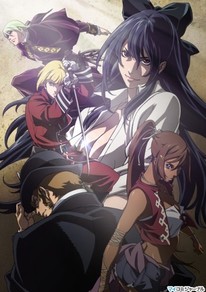Review
by Carl Kimlinger,Tatakau Shisho - The Book of Bantorra
Episodes 1-6 Streaming
| Synopsis: |  |
||
In a world where nifty Victorian fashions prevail and people's memories are crystallized into books upon their deaths, a battle between a cult known as the Shindeki Kyoudan and the keepers of the memory books, the Armed Librarians, rages. Possessed of lethal powers and headed by the beautiful but bloodthirsty Hamyuts Meseta, one would think that the Armed Librarians would have the upper hand, but the Shindeki cultists have a few tricks of their own to level the playing field with. Specifically, they have fleets of brainwashed followers with bombs embedded in their chests. When the cult lays an elaborate trap for Hamyuts Meseta, one of these followers, Colio Tonies, under the influence of a long-dead oracle, begins breaking his conditioning, setting himself to interfering with his former masters' plans. |
|||
| Review: | |||
There's a certain majesty to the speed and thoroughness with which Tatakau Shisho self-destructs. It opens with every advantage an anime could hope for and then over the course of six episodes squanders it all, leaving itself barren of all but the occasional withered remnant of interest. It's a collapse worthy of the Ancient Maya—minus the endemic warfare and human sacrifice. More's the pity; they might've helped. With its interesting fantasy conceit (books that, when touched, provide direct access to the memories of the deceased), superior production values, and a triptych of strong, sympathetic and tantalizingly interconnected leads, Tatakau Shisho initially seems poised on the cusp of fantasy excellence. The first sign that there's trouble in paradise comes when the visuals start slipping in episode two, and before long it becomes clear that the series is spinning dangerously out of control. It wants very badly to be a daring mixture of political fantasy, shonen-styled action and transcendental romance, but ends up pulling itself in so many different directions that it simply falls apart. Intriguing ideas are floated (the destructive capabilities of religious zeal, the persistence of humanity in the face of inhuman degradation) only to be abandoned and left dangling; the memory-book concept devolves into a hollow gimmick; the romance gets shunted aside to make way for fantasy riffs on bioterrorism and free will, which are in turn sidelined in favor of destructive action-movie thrills. Far from excellence, the resultant series is a flailing mess. As it barrels forward, scattering half-finished subplots in it wake, the series somehow manages to hold itself together long enough to salvage a reasonably exciting climax from the rushed and ruined remains of its plot. All else failing, Hamyuts Meseta makes an excellent action heroine, and her train-top showdown with Shindeki nasty Cigal is a genuine jaw-dropper. Which brings the series to episode five where, as if exhausted by the effort of maintaining cohesion, it falls completely to pieces. Without even a cursory attempt to address its myriad of loose ends and orphaned ideas, the series lurches into a second story arc, abandoning with shocking callousness both Colio Tonies and his time-tripping romantic partner Shiron. By episode six Hamyuts Meseta too has basically exited the picture, leaving her dull do-goodnik underlings to carry the story. The series might as well have put a shotgun in its mouth and pulled the trigger. Hamyuts, Colio and Shiron aren't just characters in the series, they are the series, and without them…well, it ends up with its brains—or more accurately, its heart—all over the roof. While the series is busy crashing and burning, its visuals are following assiduously in its footsteps. Director Toshiya Shinohara makes a deadly mistake early on by front-loading his budget, raising expectations with a spectacular first episode before allowing the animation to slip until its truncated movements and flatlining detail levels dull even the simple enjoyment of Masaki Yamada's excellent character and costume designs. Just as the series manages some excitement in spite of itself, so too does the budget somehow hold out long enough pull off some pretty nifty fights (that train-top showdown again), but eventually even they too grow perfunctory. The one thing to maintain consistent quality is the all-important (for a fantasy) background art, which ranges from menacing industrial mazes to tastefully-appointed library interiors and sprawling medieval castles—all of it quite easy on the eyes. Other than a habit of going overboard during action sequences and underboard everywhere else, Yoshihisa Hirano's score has basically no identity of its own. It does its job, and then gets out of the way as fast as possible. It's hard to criticize it for that, and equally hard to praise it. You know how they say that you can't look away from a train wreck? Tatakau Shisho is very similar to a train wreck, both in its speed and the totality of its ultimate destruction, but unlike the wreck, it's all too easy to look away from. And that's death for a television series. |
|
The views and opinions expressed in this article are solely those of the author(s) and do not necessarily represent the views of Anime News Network, its employees, owners, or sponsors.
|
| Grade: | |||
|
Overall (sub) : C+
Story : C+
Animation : C+
Art : B
Music : C+
+ Strong central cast and an interesting central concept. |
|||
| discuss this in the forum (21 posts) | | |||
| Production Info: | ||
|
Full encyclopedia details about |
||